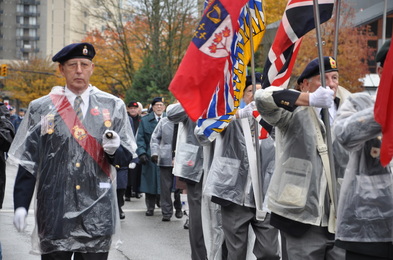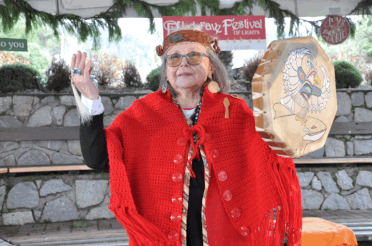 Colour Guard, Remembrance Day 2011, West Vancouver The world had never before seen the destruction of human life by human hands on the scale of this war, the world's first global war. Canada's last known World War I veteran, John Babcock, died in February, 2010 at the age of 109 years, taking with him the last living memory we have of the war that did not end all wars, but forever changed the nature of war. It brought an end to the possibility of containing war to discrete battles fought with brutal but limited weapons, ushering in an era of war on a planetary scale waged with weapons of mass destruction that target even now every human being, every living thing. It made the world incarnadine. Understanding this is essential if we are to come to terms with the significance of what men of Mr. Babcock's era, ally and enemy alike, did on the battlefield of the Ypres Salient to mark the Christmas of 1914. The fighting had commenced in October of that year. Of the 48,000 soldiers in the German Army Corps, the vast majority were young volunteers between 17 and 19 years old. This was the "child army", the "Kinderkorps". Before the arrival of the 1st Canadian Division in February 1915, to face later that spring Germany's use of deadly chlorine gas, British forces with French reinforcements and the Indian Army prevented the Germans from seizing the town of Ypres. Within the first six weeks of fighting, the allies suffered the loss of 80,000 men. On either side of the flat "no man's land", both forces struggled against heavy winter rains to dig themselves into trenches, holes the inexorable weather reduced to quagmires. Both armies were shouting distance from each other, and when they sang their music would cross no man's land sometimes to be answered by applause. Against this, General Sir Horace Smith-Dorrien, commander of the Second British Corps, issued a strict prohibition against any form of fraternization with the enemy because of "the absolute necessity of encouraging the offensive spirit of the troops." Recognizing the scale of the killing, on December 7th 1914 Pope Benedict XV proposed a global armistice to allow the celebration of Christmas. The German command agreed, but the leadership of the Allies refused. The families of soldiers on both sides sent their loved ones Christmas presents, small comforts against the killing and the cold and their homelessness in the trenches. On Christmas Eve, the Allied soldiers watched what at first might have been an especially cruel feint as the German forces, the Kindercorps, raised hundreds up of candle lit Christmas trees to the parapets of their trenches. And then they began to sing, "Stille Nacht, heilige Nacht, Alles schläft; einsam wacht [...]". The British command ordered their soldiers not to fire, but to remain vigilant. And then the British soldiers, against orders, answered with carols of their own. Both sides emerged from their trenches to shake hands, trade beer and gifts, and breathe in peace the air of this holy night. To the list of momentous things not to be forgotten this Remembrance Day, let us not forget this Christmas miracle of 1914 when the light of Christmas trees answered the challenge of a pope: to bring a generation of men at war to taste the peace of Christmas. This was a night made holy and all the sweeter because in that wilderness of the Ypres Salient they discovered the wildest thing of all: the spirit of Christmas that cannot be contained by orders, that will in a heartbeat reveal an enemy to be a friend, and restore against the barbarous logic of war the beauty of being human. For these soldiers, then, claim now a Christmas tree of your own in the Dundarave Festival of Lights. Hold them close to you when you walk the forest of Christmas trees on Dundarave Beach this Christmas Eve. War is not over; hunger, oppression and homelessness remain. It is in our hands, moved by a courage bigger than any one of us, by a spirit as ancient as it is young, to find ways to live for each other, to call each other to a deep, brave and powerful understanding of what it means to be human.
0 Comments
|
The Dundarave Festival Society
We are a circle of friends working in the Dundarave Festival of Lights Society to bring to life the promise of Christmas in our community, a season of life, passion and purpose that leaves no one in the cold. This is community-driven social change, in the true spirit of Christmas and the best spirit of our community. Archives
October 2014
Categories
All
|
LOVE & JOY COME TO YOU
Stay in touch!
|
|
We acknowledge with loving gratitude and respect that the Dundarave Festival is located on the unceded sovereign territories of the Skwxwú7mesh (Squamish), Səl̓ílwətaʔ/Selilwitulh (Tsleil-Waututh),and
xwməθkwəy̓əm (Musqueam) Nations. 150 25th Street West Vancouver BC We acknowledge the financial support of the Province of British Columbia.
This website uses marketing and tracking technologies. Opting out of this will opt you out of all cookies, except for those needed to run the website. Note that some products may not work as well without tracking cookies. Opt Out of CookiesCopyright © Dundarave Festival of Lights Society. All rights reserved.
|


 RSS Feed
RSS Feed
